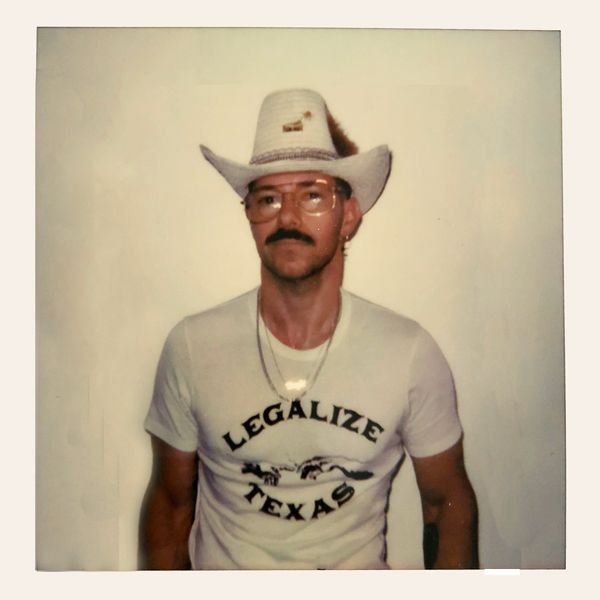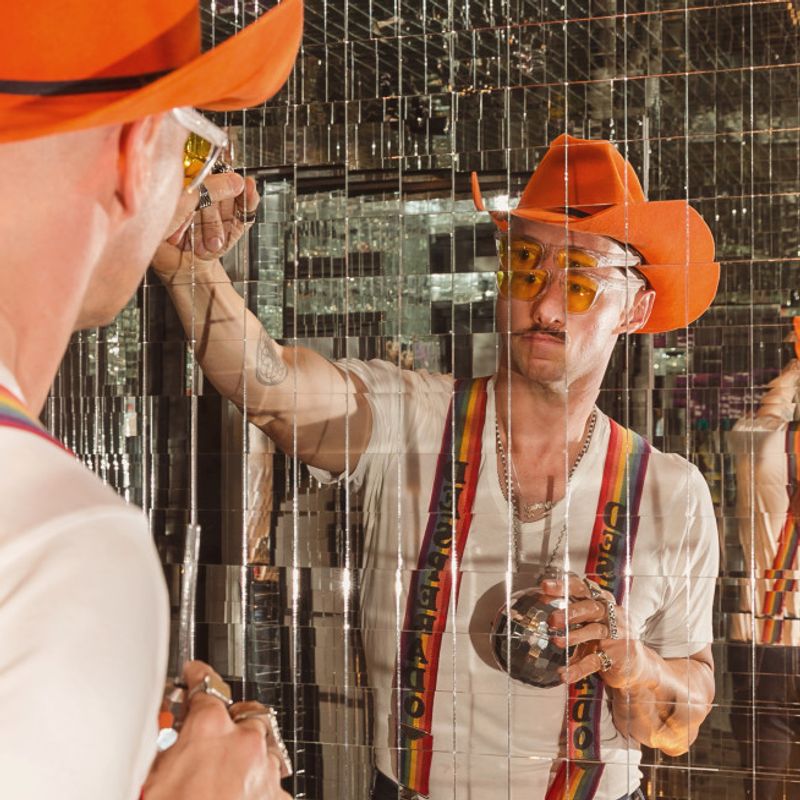




Link copied

“At some point in the future, all mainstream music becomes country music, huh?”
It’s no surprise that a conversation with Dave Wrangler turns into a discussion about the cultural branding of Billboard-aimed country between 1970 and 2005. Dave (also known as DJ Disko Cowboy) is the founder of Vinyl Ranch, the classic country music lifestyle brand. Sitting at the swaggering edge of where urban cool meets the wild west, Vinyl Ranch is playing a vital role in how country music in America is redefining itself by throwing back to “country and western” culture.
For the past 15 years, Wrangler’s been at the forefront of a resurgence of big-haired vixens, outlaws-turned-unwitting superstars and hunky dudes in ten-gallon hats, leading quintessential country cool back to the forefront of America’s zeitgeist.
As much as the early 70s was a time defined by progressive-minded traditionalists like Johnny Cash and Merle Haggard, or sensual crooners like Conway Twitty, it was also a period that saw women and marginalized artists at the top of the Billboard charts. For artists like Charley Pride, it meant a groundbreaking breakthrough. For Dolly Parton, it kicked off a five-decade run of iconic success. For a DJ and artistic designer like Disko Cowboy, it created a cornerstone aesthetic upon which a well-respected independent brand has been built.
“Much more than music, Vinyl Ranch is a ‘pop culture blender’ that occupies an aesthetic, performance art-driven, analog-era space. Or, even better, the time frame between when John Travolta starred in Saturday Night Fever in 1977 and Urban Cowboy in 1980. The brand is driven by my belief that people in each of these demographics want what they think the other has, so they pursue, romanticize and fetishize those lifestyles.”

Wrangler grew up in a space long-affiliated with this cultural split - the hill country outside of Austin, Texas. Austin is where country music’s hippie fringe nested; a city that has withstood depressions and recessions, plus benefitted from the agrarian, industrial and technological booms that have waved through the Lone Star State in the past 50 years. In that time, the city’s population has tripled and grown increasingly more racially and socially diverse.
It wasn’t JR Ewings’s Dallas or George Strait’s San Antonio where the 70s countrypolitan boom met with and exploded alongside pop country’s mainstream surge - it was Disko Cowboy’s Austin.
“When I was a teenager, all my friends and I would head into the city and go to nightclubs to discover an exciting new culture that was different from what we were experiencing in the country,” he adds. At home, Wrangler’s parents listened to country music. However, his attraction to the popularity of rave, hip-hop and club culture in the late 90s led to him becoming a DJ in 2000.
“I had a one-off vinyl party where I played classic country songs. Then people wanted to do it again. So, by popular demand, it became an event. Everyone from deep house to country fans were there, and they knew the words to songs, it was great,” Wrangler recalls. Vinyl Ranch as a party was established in 2007.
Country music as a youth and street culture movement has never been a fully defined space. But Wrangler tapping into rave culture’s peace, love, unity and respect mantra of universal togetherness and a “cowboy”-style independent spirit has proven successful. Alongside artistic success, DJ events for brands including Wrangler, Chanel, Tom Ford, Sundance Film Fest and SXSW have proven noteworthy.
Ultimately, by evolving a DJ party into a brand - as famous for country-related internet memes as it is satin jackets and baseball shirts emblazoned with “country and western” - Vinyl Ranch is changing the narrative of country music’s developing “youth and street culture.”
“A lot of people are already introduced to country music – especially the era we celebrate with Vinyl Ranch – by family,” continues Wrangler. “But there’s a large group of people who live at this urban and rural intersection like where I came from in Austin, too.”
He describes this unique intersection as what propels Vinyl Ranch’s success. Mix that in with the brand growing in acclaim as the internet becomes a leading space for community development, and the roadmap that the entrepreneur is using becomes clear. Double click on a dank Instagram meme of George Jones, Dolly Parton, or yes, one referencing Alan Jackson’s 1992-released single ‘Chattahoochee’, and Vinyl Ranch’s “communal” impact has consumed you, too.
However, Vinyl Ranch’s swagger is not built on hoochie-coochie alone. Instead, it’s in dialing in hip hop’s influence on the genre to an era before Nelly and Tim McGraw partnered for ‘Over and Over’. Namely ‘Ponyhucci’ (Disko Cowboy’s mashup of Alan Jackson with soul crooner Ginuwine’s legendary 1996 single ‘Pony’), which showcases the next ultra-connective level of marketing success for the brand – and potentially for country music overall.
A ‘Chattahoochee’ x ‘Pony’ mashup is a recipe for dancefloor mayhem and a bold move in creating an iconic, instantaneously recognizable brand at a time when country music is having a “cool” moment.
“‘Ponyhucci’ is a home run,” Wrangler jokes. “I typically end my DJ sets with Donna Summer’s ‘Last Dance.’ However, I decided to do something different for Austin City Limits [October 2021]. So I told the partiers that my last dance would be a slow jam and dropped the ‘Pony’ beat followed by ‘Chattahoochee’. People lost their minds!”
Mind-blowing communal experiences are par for the course for Vinyl Ranch and will continue into 2022 and beyond. This year, the brand kicks off with a collaboration with western wear brand Kennimer on an exclusive rancher cowboy hat. When asked to summarize his aims for Vinyl Ranch, Dave Wrangler offers a pointed and hopeful note:
“I want Vinyl Ranch to be synonymous with content about country music and its historical culture that ‘remixes it’ into a simple, fun and digestible way to invite everyone into the culture without them feeling alienated.”
---
For more from Vinyl Ranch, click here, or follow the brand's Instagram here.





